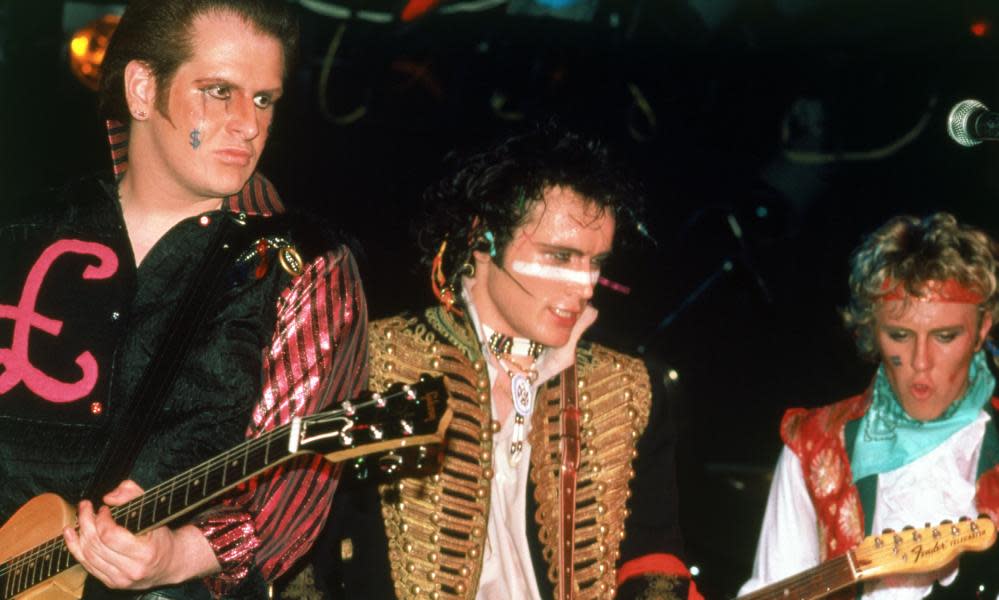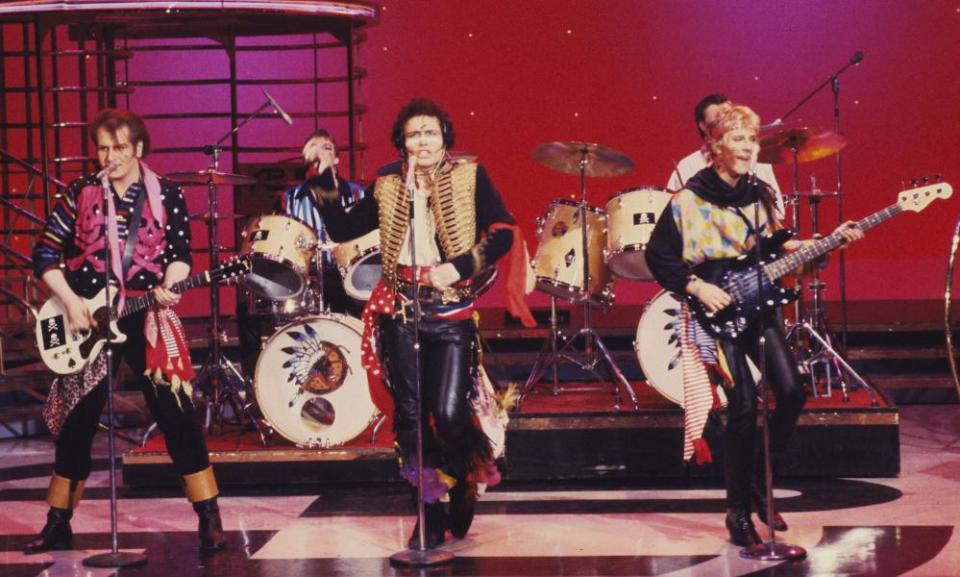Adam and the Ants: how the wild tribe revealed pop's theatre of dreams

I’ve thought about it a lot in the intervening 40 years: why Adam and the Ants? I was a prime candidate for obsessive pop fandom – nine years old, glued to Top of the Pops on a weekly basis, an early adopter of Smash Hits, already spending whatever money I had on records – but why them specifically? After all, I was spoilt for choice. It was 1980, as miraculous a year for singles as Britain has ever seen. I could have alighted on the two-tone movement, or Gary Numan, or thrown in my lot with the Jam and the burgeoning mod revival. But I didn’t: it was Adam and the Ants, the night in October they opened TOTP with Dog Eat Dog.
Maybe they were a band inadvertently designed to appeal to a nine-year-old boy: songs about pirates and Native American tribes and highwaymen, a lot of shouting, a lot of cocky lyrics about how amazing Adam and the Ants were. Maybe because glam rock was the first music I could remember – relatives’ copies of Block Buster! and My Coo-Ca-Choo; Marc Bolan’s kids TV show; seeing Wizzard on television and running screaming from the room, terrified by the sight of Roy Wood – and Adam and the Ants were ultimately a glam rock band: two drummers, like the Glitter Band; makeup; loud guitars; chanting, all of it derived from glam.

Whatever it was, it got me. For the next 18 months, I tied my colours to their mast in a way I never had with any artist before, and never would again. I bought everything: not just the new singles, but the stuff the previous incarnation of Adam and the Ants had put out, which was hastily rereleased in the wake of their success. The fact that it sounded almost nothing like the band did now didn’t bother me at all, perhaps because it occupied me in other ways: I had no idea what the S&M-themed Whip in My Valise was supposed to be about, but I definitely clocked it was something adult, illicit, something I wasn’t supposed to know about, which automatically made it weirdly thrilling.
A lot of other people were clearly doing something similar – from late-1980 to mid-1982, Adam and the Ants were unequivocally the biggest pop stars in Britain, so famous that, at one point in 1981, they had seven singles in the Top 40. Nevertheless, in my case, fandom was an oddly solitary pursuit. Nobody I knew liked them as much as me (the general consensus at school was that Adam Ant’s fondness for makeup made him a “gaylord”), I was too young to go to gigs, and I never thought to contact any other fans via the penpal columns in the pop magazines.
Instead of forming a bond with my fellow Antpeople, my obsession found expression in other ways. Not content with putting posters on my wall, I put up literally anything containing Adam Ant’s name: the text from interviews, news stories, small ads. (“You’re basically just sticking up little bits of paper with ‘Adam Ant’ written on them,” protested my increasingly weary mother.) At one juncture, I bought a box of face paint and made myself up in what must have been a very rough approximation of Adam’s famous white-stripe look. Short in stature then and now, I imagine I looked less like Adam Ant than Ronnie Corbett when he was impersonating Adam Ant on The Two Ronnies. Incredibly, I then went out on my bike looking like that. I came home fairly swiftly, the word “gaylord” once more ringing in my ears.
It ended almost as unexpectedly as it had begun. Primed for its release by the incredible singles Stand and Deliver and Prince Charming – the latter, I think, still the weirdest-sounding song ever to make No 1 – I brought the Prince Charming album home from Boots in a state of excitement. I didn’t like it. Or rather, I didn’t like it anywhere near as much as I liked Kings of the Wild Frontier. That might have been the first time I ever made a proper critical judgment about an album. Up to that point, I’d worked on the principle that pop music was great per se, as evidenced by the bizarre eclecticism of my record collection, where Two Pints of Lager and a Packet of Crisps Please by Splodgenessabounds jostled for space with the oeuvre of impossibly smug singer-songwriter BA Robertson, and United by Judas Priest coexisted with Donna Summer’s cover of MacArthur Park.
I stuck it out until 1982’s Friend or Foe, but my affections were waning. When Desperate But Not Serious barely scraped into the Top 40 that Adam and the Ants had dominated 12 months before, I was glumly unsurprised: anyone could tell this was not a single made of the same vibrant, vital stuff as Dog Eat Dog or Kings of the Wild Frontier.
Related: Sign up for the Sleeve Notes email: music news, bold reviews and unexpected extras
By then, it didn’t matter. I didn’t realise it at the time, but Adam and the Ants buried themselves so deep in my psyche they continue to exert an influence on my music taste today. They were my first love, and, like a lot of first loves, I never entirely got over them: 40 years later, I still like thunderous drums and feedback-laden guitars. I still like bands that dress up and wear makeup in a way that suggests they think ridicule is nothing to be scared of. I love the idea that pop music is a theatre of dreams where people reinvent themselves. And I love artists who also act as curators, whose music functions as a kind of portal into an auxiliary world of visual art and literature and film.
Adam and the Ants were the first band I encountered that did that: in interviews, Adam talked about spaghetti westerns, the artists Allen Jones and Stanley Spencer, Dirk Bogarde and Montgomery Clift, the film-maker John Sampson. I didn’t rush out aged nine and watch Sampson’s documentary on sexual fetishism, Dressing for Pleasure, but I definitely filed all that information away. At university, I wrote a dissertation on the playwright Joe Orton. I did that because I love Orton’s writing, but the truth is that I’d only picked up a book of his plays in the first place because I remembered Adam Ant mentioning him.

 Yahoo News
Yahoo News 
